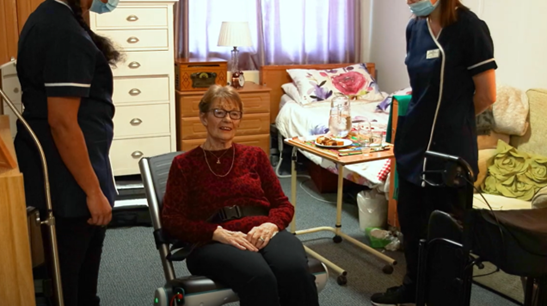6 February 2026
Have your say on proposals to relocate Mount Vernon Cancer Centre –…
People across Bedfordshire, Hertfordshire and surrounding areas have been invited to have their say on proposals to relocate Mount Vernon Cancer Centre to a new,…


Home » News » Supplying local care homes with chairs to lift residents after a fall saves staff time and reduces ambulance call-outs
A chair which helps lift care home residents safely and quickly in an emergency after a fall has been proven to reduce avoidable ambulance callouts and associated healthcare costs, improve care, and free up staff time for other caring duties.

When a resident has a fall, staff use a medically-approved falls assessment to help them check for injury and assess whether an ambulance is needed. If the assessment finds they can be safely lifted, the Raizer chair is assembled around them to lift them up. The less time spent on the floor after a fall, the less likely they are to need an ambulance callout or a trip to hospital.
Following an initial pilot, the Digitising Social Care programme at Bedfordshire, Luton and Milton Keynes Integrated Care System provided 174 Raizer chairs to local care organisations – mostly residential care facilities and nursing homes.
A total of 1,383 falls were recorded in the first 90 days of each provider receiving the Raizer chair, of which almost half were supported by the chair. In most of the other cases, the resident was able to stand up on their own or were lifted by another method, and in 172 cases, an ambulance callout was required – although only 66 trips to hospital were needed.
The findings confirm a number of benefits and an impressive return on investment.
Laura Gibney, manager of Collinson Care Home in Luton, said:
“We have found the chair really useful. I attended the training initially and have then trained my staff how to use it, it is really easy to use and assemble, and we are extremely pleased.”
A further pilot is currently running with domiciliary care providers, and the findings will be evaluated separately in the spring.
To find out more about the Bedfordshire, Luton and Milton Keynes Digitising Social Care programme, visit https://blmkhealthandcarepartnership.org/about/our-priorities/data-and-digital/digitising-social-care-disc-programme.
For press enquiries, please email blmkicb.communications@nhs.net
6 February 2026
Have your say on proposals to relocate Mount Vernon Cancer Centre –…
People across Bedfordshire, Hertfordshire and surrounding areas have been invited to have their say on proposals to relocate Mount Vernon Cancer Centre to a new,…
4 February 2026
Bedford and Central Bedfordshire residents to be offered lung cancer screening
Eligible people living in the Bedford and Central Bedfordshire areas are to be invited to come forward for lung cancer screening, as the mobile screening…
4 February 2026
On World Cancer Day, Denise marks 10 years since her first breast…
“I was inundated with messages of hope,” says Denise Coates, thinking back almost a decade to the first time she spoke out about her breast cancer diagnosis. “There’s nothing positive…
2 February 2026
More appointments on offer in general practices, new figures show
The number of appointments available at general practices in Bedfordshire, Luton and Milton Keynes continued to rise in the three months to November 2025, according to new data published by…
29 January 2026
Urgent dental appointments now available in Bedfordshire, Luton and Milton Keynes
Extra appointments are available now for people in Bedfordshire, Luton and Milton Keynes who need urgent or emergency dental care. There are 700,000 extra urgent dental appointments being rolled out…
20 January 2026
Pharmacy First sore throat consultations up by over 80% as winter illnesses…
New figures from NHS England show that almost 5,000 patients in Bedfordshire, Luton and Milton Keynes used the Pharmacy First scheme to get treatment for a sore throat without seeing…